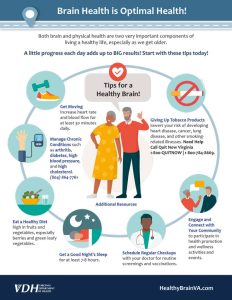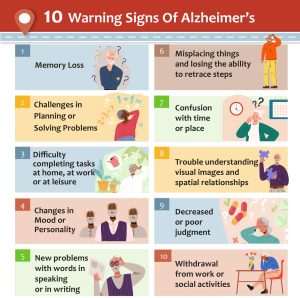
The impact of Alzheimer’s is projected to rise by 2025, and the most recent data show:
- 150,000 people aged 65 and older are living with Alzheimer’s in Virginia.
- 9.5% of people aged 45 and older have subjective cognitive decline.
- 354,000 family caregivers bear the burden of the disease in Virginia.
- 529 million hours of unpaid care provided by Alzheimer’s caregivers.
- $10.3 billion is the value of the unpaid care.
- $1 billion is the cost of Alzheimer’s to the state Medicaid program.
Research is still evolving, but we’re learning more each day about how lifestyle changes in diet and exercise, along with learning new things and staying socially active, may help to reduce the risk of cognitive decline, Alzheimer's disease or dementia.
Brain Health
The brain is like a big team, and each part has its own job, like remembering things, feeling emotions, and controlling how we act. Dementia happens when some of these brain cells get hurt or go away, making it hard for the brain to work right. One big reason for dementia is just getting older. Some people are more likely to get dementia if it runs in their family if they have a little trouble thinking sometimes, or if they are Black/African American or Hispanic/Latino.
Alzheimer's disease is not a normal part of aging. Forgetting things is often the first sign of Alzheimer's and related memory issues. People with Alzheimer's may also have trouble with tasks they used to do easily, getting lost, managing money, making decisions, losing things often, and experiencing changes in mood or behavior. It's important to remember that having these signs doesn't always mean someone has Alzheimer's.
There are different kinds of dementia, and each one affects the brain in its own way. Some common types are:
Know Your Risk Quiz for Alzheimer’s Disease or Related Dementia:
Here are five questions to help you understand your chances of getting Alzheimer’s disease:
- How old are you?
-
- Most people who get Alzheimer's are 65 or older. As you get older, your risk goes up. About 1 in 13 people between 65 and 84 have Alzheimer's, and 1 in 3 people over 85 have it.
2. Does Alzheimer's run in your family?
-
- If your family has a history of Alzheimer's, you might be at a higher risk. But not everyone with a family history gets it, and not everyone who gets it has a family history.
3. What's your lifestyle like?
-
- Certain things you do every day, like eating healthy, exercising, and staying mentally active, can help keep your brain healthy and lower your risk.
4. What medical conditions do you have?
-
- Some health problems, like high blood pressure and heart disease, can increase your chances of getting Alzheimer's. It's important to take care of these conditions.
5. What about biomarkers?
-
- Biomarkers are used to help understand Alzheimer's better. Some tests can give clues about your risk, but they can't say for sure if you'll get the disease.
Remember, staying healthy and taking care of yourself can lower your risk of Alzheimer's, but there's no sure way to prevent it.
What to do if you suspect Alzheimer’s Disease or Related Dementia:
Visiting a physician will help determine whether you have Alzheimer's disease or something simpler to manage, such as low vitamin levels or adverse drug reactions. Early detection will help with financial planning, decision-making, research study participation, and future care planning.
Additionally, there are Memory Assessment Centers across Virginia where you or your loved one can receive a diagnosis and treatment.


